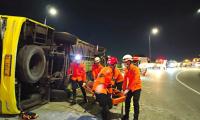Broadening of tax becomes a far cry on the face of the fact that the government machinery becomes ineffective by even enforcing return on the registered taxpayers. Today, less than 50 percent of the registered taxpayers in all the streams of revenue are filling their return and the remaining are thus non filers.
As a compensatory response to the above situation, the government has been moving to the levy of withholding taxation. It is a disparate move to compensate for the loss they made due to the USAS and its gross misuse by the existing taxpayers.
It further deteriorated to an embarrassing level of transactional taxation, as a covering up of tax losses. Income taxation has virtually been replaced with withholding tax and a transactional tax system.
Though withholding tax is a direct tax being indirectly collected, it is a glaring admission of the state that it has lost its writ in the matter of taxing its citizens in a straight and direct manner.
This has killed the age-old philosophy of direct taxation, proportionate to the capacity to pay (more income more taxes, no income no taxes), thus burying the universal principal of taxation.
If you carefully study the pie of revenue, the share of direct taxes has gradually gone down. The withholding tax/transaction/tax/sales tax/FED are the major revenue spinners pushing out the direct tax into a marginalised level, looking like indirect, regressive and unrealistic.
Through this step, the government defended its short-term interest, revenue in absolute terms for a short period of time but with steep fall in tax-to-GDP ratio, and above all, rapidly consumed the space of expansion or any growth in future.
Thus, a state of stagnation and stalemate in revenue has arrived.
Taxation is a strong economic tool of social justice, reducing income inequality, and economic development.
None of this is being achieved and this is the major reason why the rich are getting richer and the poor becoming poorer.
It can be hoped that the present government has a solution to this.
This system of taxation definitely needs a change, but a home-grown one, and with the ownership of applying machinery.
The FBR manpower and its satisfaction in terms of infrastructural and logistical support coupled with monetary rewards will play a critical role in enforcing the writ of the state, for collecting due taxes.
FBR hierarchy needs to be consoled rather than bashed, which always proved counterproductive. FBR is state machinery, and state has full authority to mend it the way it wishes to, but treating them as opponents is costing more to the state in terms of losses than gains.
The mechanism of accountability of the delinquents, unruly and corrupt officers/officials is a prerequisite for the success of the change. To make the change permanent, all these steps need to be institutionalised rather than done in a rash, emotional and irrational manner to save it from failure as has been done in the past.
In the present system, there are taxpayers who have no tax officers and conversely there are officers who have no taxpayers to tax.
It is essential to place district taxation officers with full legal, administrative and financial competence as mini chief commissioners, for broadening of tax base. Stricter compliance to the tax laws must be ensured as well.
The school of finance and taxation and international school of custom are essential, for creating human capital that matches international standards.
Legal framework needs to be re-visited to wash it out from the anomalies and encroachments on the custom and IRS authority for any fair and transparent accountability in future.
The application of value-added tax vs GST is essential for broadening of tax base, and to avoid any future amnesty on the request of the traders who actually are opposing the VAT.
The present amnesty may be used as a trade off with traders for accepting the VAT against the GST. It is for the government to see for itself as what is best for national revenue interest in future. It they listen to sane voices they are going to benefit more than anyone else.
The writer is former FBR chairman















